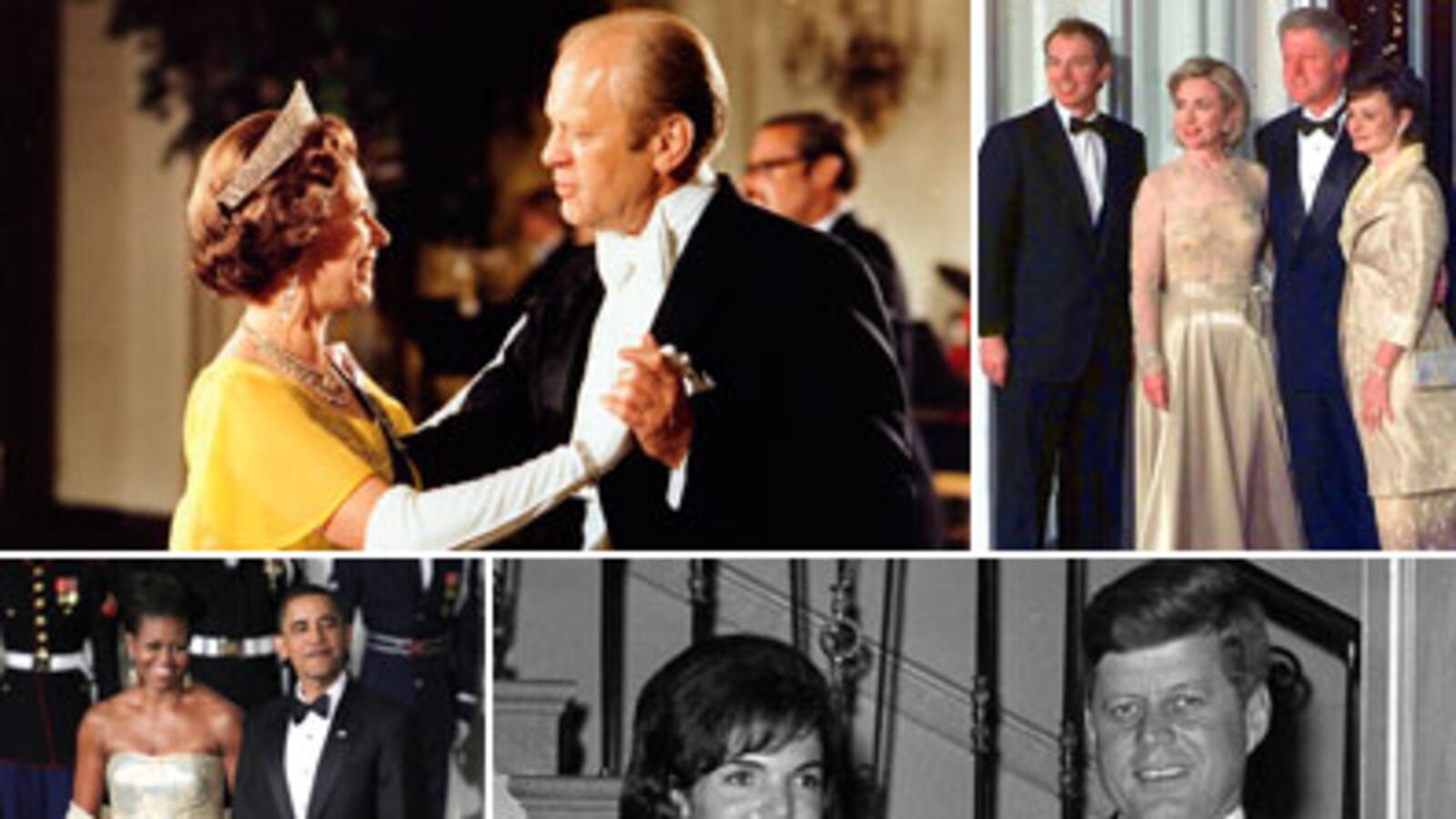Mexican President Felipe Calderon criticized Arizona's harsh new immigration law during his visit to the White House prior to President Obama's state dinner with Mexico. Calderon called for an immigration policy that departs from "such laws as the Arizona law, which is forcing our people to face discrimination." Dayo Olopade on the Obama-Calderon friendship—and what’s on the menu.
These are jittery times in Washington. President Felipe Calderon of Mexico arrives for a visit with President Barack Obama on the heels of a catastrophic oil spill, primary upsets for Democratic candidates, and just as rhetoric surrounding illegal immigration into the American Southwest has reached the screaming point. Given the White House’s new focus on immigration reform, its second official state dinner will be more concerned with security than the last—not just at the White House gates, but at the border that joins Mexico and the United States.
Click Below to View Our Gallery of Past State Dinners

Tensions will be running high, but at least the two leaders will be toasting one another as friends. Obama held a private meeting with Calderon even before his 2009 inauguration, visited Mexico last April and August, and has bumped elbows with Calderon nearly once a month, at events from the Summit of the Americas to the G20 meetings in Pittsburgh. First lady Michelle Obama likewise hit it off with Calderon’s wife Margarita Zavala during her April trip to Mexico City—her first solo voyage since moving to Washington. “She is smart. She is tough. She is passionate. And she is my friend,” Obama said last month. “And I told her to prepare to have fun.”
The one person who won’t be having fun is Julianna Smoot, the new White House social secretary. The 200-person dinner in the East Room, catered by Chicago celebrity chef Rick Bayless, promises to be just as lavish as the first dinner in November. But after the embarrassing security breach that stole headlines from Indian Prime Minister Manmohan Singh, and led to the departure of Smoot’s predecessor, Desiree Rogers, most people at the White House have decided this time around will be more business than pleasure.
Rather than showing off the White House china being used for the dinner, the East Wing has scheduled an event with Michelle Obama and Zavala at a local high school. The latest iteration of the first lady’s “Let's Move!” anti-obesity initiative is perhaps more appropriate for the high-powered lawyers (Zavala, who uses her maiden name, served in Mexico’s Congress from 2003-2006) with young children and strong opinions on public policy.
Calderon will appear with Obama in advance of the dinner Wednesday and then address a joint session of Congress on Thursday. He is expected to reinforce a message of mutual cooperation with the Obama administration, “from Honduras to Haiti to Iran,” according to a senior administration official, and stress development in Mexico as a solution to the problem of illegal immigration to the U.S. “One in 10 Mexicans live abroad because they haven’t found opportunity at home,” says Andrew Selee, director of the Mexico Institute at the Woodrow Wilson Center. Acknowledging this fact “would be a major step to shift the debate.”
Calderon is also expected to offer a strong critique of the Arizona law permitting police to question the immigration status of residents, which Mexicans believe is discriminatory and American progressives have taken to calling “Juan Crow.” “The Arizona law is what happens when Congress and the president don’t do their job on comprehensive reform,” says Martine Apodaca of the National Immigration Forum. “We’ve seen half-hearted measures and rudderless leadership.”
Suddenly, 11 other states are considering such laws—and Calderon, whose rocky term as president will soon end, has something to prove; his standing at home is a bit shaky. “Right now he’s the president who taught everyone to sneeze into their sleeve,” says Juan Pardinas, a columnist for Mexican conservative newspaper Reforma—referring to Mexico’s swine flu epidemic in 2009. “He has a huge problem with legacy.” He may therefore use the speech to stand up for Hispanics in America—and pressure the U.S. government to act on the framework for reform proposed by Senators Bob Menendez, Lindsey Graham and Charles Schumer in April. “[Former Mexican President] Vicente Fox told [George W.] Bush he had forgotten about Latin America,” says Apodaca. “President Calderon might say the same.”
Obama has his own political landmines to navigate. “Clearly Obama will have to say something about immigration policy,” says Selee. “And whenever U.S. presidents do something with Mexican counterparts, they are inevitably thinking about domestic Latino politics.” Obama, who is hoping to consolidate Democratic gains among Hispanic voters, has already called the Arizona law “misguided”—but may go further in advance of Wednesday’s news conference. “You might see the Justice Department file an injunction against the law—this would be a strategic moment to do it,” adds Selee. (The White House indicates that is unlikely.) Some activists want tough talk on documented human and civil rights violations associated with Calderon’s aggressive war on drug cartels— though as The Daily Beast has written, the Mexican military doesn’t take kindly to outsider advice.
“[Former Mexican President] Vicente Fox told [George W.] Bush he had forgotten about Latin America,” says Apodaca. “President Calderon might say the same.”
The White House event, like the October 2009 “Fiesta Latina” event (at which the president danced with Mexican pop star Thalia) or this year’s splashy Cinco de Mayo celebration on the South Lawn, seeks to honor what Obama called an “unbreakable” bond between Mexico and the U.S. A sneak peek at the guest list also suggests a change in the in-crowd. Whereas the roster for Bush’s 2001 state dinner with Fox featured former attorney general Alberto Gonzalez and Texas governor Rick Perry, the Obama invitees are younger and more progressive—and include Los Angeles Mayor Antonio Villaraigosa, pioneering urban farmer Will Allen, and Julian Castro, the young mayor of San Antonio written up in The New York Times as a future presidential contender.
“They’ve tried to be much more plural in whom they invite to White House functions, reaching beyond the beltway,” says Selee. Other expected guests include Mexican-American actors Eva Longoria Parker and George Lopez.
Despite the glam factor, there is work to be done. In 2009, Obama and Calderon unveiled a revised U.S.-Mexico border security policy that focused $700 million on improving police and judicial capacity in Mexico, and reducing violence in Tijuana and Ciudad Juarez, two border towns wracked by drug-related violence. And last week, the United States released a new policy outlining specific proposals to reduce drug demand in America. Also on the dinner table: an unresolved trade dispute over Mexican trucks flowing into the United States.
The Obama administration, and particularly Secretary of State Hillary Clinton, has emphasized mutual responsibility as the new norm for Mexican-American relations. “We’ve seen a switch, an expansion of the agenda with Mexico beyond the military side of it, to an approach that incorporates the socioeconomic factors that cause violence,” says Shannon O’Neil of the Council on Foreign Relations. A working lunch at the State Department Wednesday will offer Clinton and other key policy stakeholders in and outside of government to press Calderon about his plans for the drug war, border security, and diplomatic ties between the U.S. and Mexico—including the topic of energy security and climate change.
“We’ll hear about a cleaner North America, led by the United States and Mexico,” says O’Neil. Mexico is hosting the United Nations conference on climate change in November.
Dayo Olopade is a political reporter for The Daily Beast and a Bernard Schwartz Fellow at the New America Foundation.






